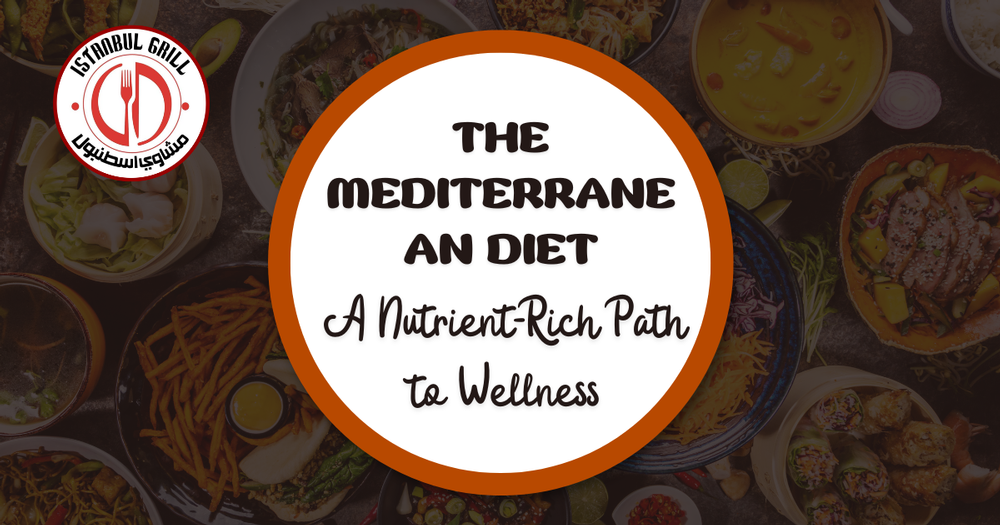The Mediterranean Diet: A Nutrient-Rich Path to Wellness

The Mediterranean diet is much more than just a way of eating; it's a lifestyle that has been associated with numerous health benefits. Based on the traditional dietary patterns of countries bordering the Mediterranean Sea, this diet has garnered attention for its potential to promote heart health, weight management, and overall well-being. In this comprehensive blog post, we will delve into the principles, benefits, and practical tips for adopting the Mediterranean diet.
Introduction to the Mediterranean Diet: A Cultural Legacy
The Mediterranean diet is rooted in the culinary traditions of countries such as Greece, Italy, Spain, and southern France. These regions have historically demonstrated lower rates of chronic diseases like heart disease, diabetes, and certain cancers. The diet is characterized by an abundance of nutrient-rich foods and is often considered more of a lifestyle than a strict regimen.
Key Principles of the Mediterranean Diet: What to Eat
-
Plant-Based Foods: The diet places a strong emphasis on fruits, vegetables, whole grains, legumes, nuts, and seeds. These foods are packed with vitamins, minerals, fiber, and antioxidants that contribute to overall health.
-
Healthy Fats: Olive oil is a staple in the Mediterranean diet, providing monounsaturated fats that support heart health. Fatty fish, such as salmon and sardines, are rich in omega-3 fatty acids, which have anti-inflammatory properties.
-
Lean Proteins: Poultry, eggs, and dairy products are consumed in moderation. The diet encourages lean protein sources while minimizing red meat consumption.
-
Herbs and Spices: Herbs and spices are used generously to flavor dishes, reducing the need for excess salt. This adds depth to meals and contributes to the diet's anti-inflammatory benefits.
-
Moderate Wine Consumption: If alcohol is consumed, it's typically in moderation and often in the form of red wine. This is believed to be one of the factors contributing to the diet's heart-protective effects.
Health Benefits of the Mediterranean Diet
-
Heart Health: The diet's focus on healthy fats, fiber, and antioxidants has been linked to a reduced risk of heart disease. It can lower LDL ("bad") cholesterol levels and improve overall cardiovascular health.
-
Weight Management: The Mediterranean diet is naturally rich in whole, nutrient-dense foods, making it easier to control portion sizes and avoid overeating. Its emphasis on lean proteins and healthy fats can also support weight loss or maintenance.
-
Diabetes Prevention: The diet's emphasis on whole grains, legumes, and low-glycemic index foods can help regulate blood sugar levels, reducing the risk of type 2 diabetes.
-
Brain Health: The omega-3 fatty acids found in fish and the antioxidants in fruits and vegetables are believed to support cognitive function and reduce the risk of cognitive decline.
-
Cancer Prevention: The diet's abundance of antioxidants, phytochemicals, and fiber may play a role in reducing the risk of certain types of cancer, such as breast and colorectal cancer.
Practical Tips for Adopting the Mediterranean Diet
-
Base Meals on Plant Foods: Make vegetables, fruits, whole grains, legumes, nuts, and seeds the foundation of your meals.
-
Use Olive Oil: Choose extra-virgin olive oil for cooking and as a dressing. It's rich in heart-healthy monounsaturated fats and antioxidants.
-
Include Fatty Fish: Aim for at least two servings of fatty fish per week to get your dose of omega-3 fatty acids.
-
Limit Red Meat: Consume red meat sparingly and opt for lean protein sources like poultry and fish instead.
-
Enjoy Dairy in Moderation: Choose low-fat or Greek yogurt and small portions of cheese for calcium and protein.
-
Flavor with Herbs and Spices: Experiment with fresh herbs, garlic, onions, and spices to add depth to your dishes.
-
Moderate Wine Consumption: If you drink alcohol, do so in moderation and preferably with meals.
-
Stay Active: Regular physical activity is a key component of the Mediterranean lifestyle. Incorporate exercise into your routine.
In Conclusion
The Mediterranean diet offers a well-rounded approach to nutrition and wellness, drawing on the traditions of a region known for its good health and longevity. By prioritizing nutrient-dense foods and adopting a balanced lifestyle, you can enjoy the numerous benefits that this diet has to offer. Remember that no single diet is a perfect fit for everyone, so it's essential to consult with a healthcare professional before making any significant dietary changes. Embrace the Mediterranean way of eating as a journey towards improved health and a greater appreciation for the pleasures of food.